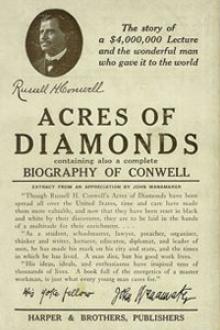Acres of Diamonds - Russell H. Conwell (big screen ebook reader .txt) 📗

- Author: Russell H. Conwell
- Performer: 1599869802
Book online «Acres of Diamonds - Russell H. Conwell (big screen ebook reader .txt) 📗». Author Russell H. Conwell
But a rich man’s son can never know that.
He takes his bride into a finer mansion, it may be, but he is obliged to go all the way through it and say to his wife, “My mother gave me that, my mother gave me that, and my mother gave me this,” until his wife wishes she had married his mother. I pity the rich man’s son.
The statistics of Massachusetts showed that not one rich man’s son out of seventeen ever dies rich. I pity the rich man’s sons unless they have the good sense of the elder Vanderbilt, which sometimes happens. He went to his father and said, “Did you earn all your money?” “I did, my son.
I began to work on a ferry-boat for twenty-five cents a day.” “Then,” said his son, “I will have none of your money,” and he, too, tried to get employment on a ferry-boat that Saturday night.
He could not get one there, but he did get a place for three dollars a week. Of course, if a rich man’s son will do that, he will get the discipline of a poor boy that is worth more than a university education to any man. He would then be able to take care of the millions of his father. But as a rule the rich men will not let their sons do the very thing that made them great. As a rule, the rich man will not allow his son to work—and his mother!
Why, she would think it was a social disgrace if her poor, weak, little lily-fingered, sissy sort of a boy had to earn his living with honest toil. I have no pity for such rich men’s sons.
I remember one at Niagara Falls. I think I remember one a great deal nearer. I think there are gentlemen present who were at a great banquet, and I beg pardon of his friends. At a banquet here in Philadelphia there sat beside me a kind-hearted young man, and he said, “Mr.
Conwell, you have been sick for two or three years.
When you go out, take my limousine, and it will take you up to your house on Broad Street.”
I thanked him very much, and perhaps I ought not to mention the incident in this way, but I follow the facts. I got on to the seat with the driver of that limousine, outside, and when we were going up I asked the driver, “How much did this limousine cost?” “Six thousand eight hundred, and he had to pay the duty on it.”
“Well,” I said, “does the owner of this machine ever drive it himself?” At that the chauffeur laughed so heartily that he lost control of his machine. He was so surprised at the question that he ran up on the sidewalk, and around a corner lamp-post out into the street again. And when he got out into the street he laughed till the whole machine trembled. He said: “He drive this machine!
Oh, he would be lucky if he knew enough to get out when we get there.”
I must tell you about a rich man’s son at Niagara Falls. I came in from the lecture to the hotel, and as I approached the desk of the clerk there stood a millionaire’s son from New York.
He was an indescribable specimen of anthropologic potency. He had a skull-cap on one side of his head, with a gold tassel in the top of it, and a gold-headed cane under his arm with more in it than in his head. It is a very difficult thing to describe that young man. He wore an eye-glass that he could not see through, patent-leather boots that he could not walk in, and pants that he could not sit down in—dressed like a grasshopper. This human cricket came up to the clerk’s desk just as I entered, adjusted his unseeing eye-glass, and spake in this wise to the clerk.
You see, he thought it was “Hinglish, you know,”
to lisp. “Thir, will you have the kindness to supply me with thome papah and enwelophs!”
The hotel clerk measured that man quick, and he pulled the envelopes and paper out of a drawer, threw them across the counter toward the young man, and then turned away to his books. You should have seen that young man when those envelopes came across that counter. He swelled up like a gobbler turkey, adjusted his unseeing eye-glass, and yelled: “Come right back here. Now thir, will you order a thervant to take that papah and enwelophs to yondah dethk.” Oh, the poor, miserable, contemptible American monkey! He could not carry paper and envelopes twenty feet.
I suppose he could not get his arms down to do it. I have no pity for such travesties upon human nature. If you have not capital, young man, I am glad of it. What you need is common sense, not copper cents.
The best thing I can do is to illustrate by actual facts well-known to you all. A. T. Stewart, a poor boy in New York, had $1.50 to begin life on.
He lost 87 <1/2> cents of that on the very first venture.
How fortunate that young man who loses the first time he gambles. That boy said, “I will never gamble again in business,” and he never did. How came he to lose 87 <1/2> cents? You probably all know the story how he lost it—because he bought some needles, threads, and buttons to sell which people did not want, and had them left on his hands, a dead loss. Said the boy, “I will not lose any more money in that way.” Then he went around first to the doors and asked the people what they did want. Then when he had found out what they wanted he invested his 62 <1/2>
cents to supply a known demand. Study it wherever you choose—in business, in your profession, in your housekeeping, whatever your life, that one thing is the secret of success. You must first know the demand. You must first know what people need, and then invest yourself where you are most needed. A. T. Stewart went on that principle until he was worth what amounted afterward to forty millions of dollars, owning the very store in which Mr. Wanamaker carries on his great work in New York. His fortune was made by his losing something, which taught him the great lesson that he must only invest himself or his money in something that people need.
When will you salesmen learn it? When will you manufacturers learn that you must know the changing needs of humanity if you would succeed in life? Apply yourselves, all you Christian people, as manufacturers or merchants or workmen to supply that human need. It is a great principle as broad as humanity and as deep as the Scripture itself.
The best illustration I ever heard was of John Jacob Astor. You know that he made the money of the Astor family when he lived in New York.
He came across the sea in debt for his fare. But that poor boy with nothing in his pocket made the fortune of the Astor family on one principle.
Some young man here to-night will say, “Well they could make those fortunes over in New York but they could not do it in Philadelphia!” My friends, did you ever read that wonderful book of Riis (his memory is sweet to us because of his recent death), wherein is given his statistical account of the records taken in 1889 of 107
millionaires of New York. If you read the account you will see that out of the 107 millionaires only seven made their money in New York. Out of the 107 millionaires worth ten million dollars in real estate then, 67 of them made their money in towns of less than 3,500 inhabitants. The richest man in this country to-day, if you read the real-estate values, has never moved away from a town of 3,500 inhabitants. It makes not so much difference where you are as who you are.
But if you cannot get rich in Philadelphia you certainly cannot do it in New York.
Now John Jacob Astor illustrated what can be done anywhere. He had a mortgage once on a millinery-store, and they could not sell bonnets enough to pay the interest on his money. So he foreclosed that mortgage, took possession of the store, and went into partnership with the very same people, in the same store, with the same capital. He did not give them a dollar of capital.
They had to sell goods to get any money. Then he left them alone in the store just as they had been before, and he went out and sat down on a bench in the park in the shade. What was John Jacob Astor doing out there, and in partnership with people who had failed on his own hands?
He had the most important and, to my mind, the most pleasant part of that partnership on his hands. For as John Jacob Astor sat on that bench he was watching the ladies as they went by; and where is the man who would not get rich at that business? As he sat on the bench if a lady passed him with her shoulders back and head up, and looked straight to the front, as if she did not care if all the world did gaze on her, then he studied her bonnet, and by the time it was out of sight he knew the shape of the frame, the color of the trimmings, and the crinklings in the feather. I sometimes try to describe a bonnet, but not always. I would not try to describe a modern bonnet. Where is the man that could describe one? This aggregation of all sorts of driftwood stuck on the back of the head, or the side of the neck, like a rooster with only one tail feather left. But in John Jacob Astor’s day there was some art about the millinery business, and he went to the millinery-store and said to them: “Now put into the show-window just such a bonnet as I describe to you, because I have already seen a lady who likes such a bonnet. Don’t make up any more until I come back.” Then he went out and sat down again, and another lady passed him of a different form, of different complexion, with a different shape and color of bonnet. “Now,”
said he, “put such a bonnet as that in the show window.” He did not fill his show-window up town with a lot of hats and bonnets to drive people away, and then sit on the back stairs and bawl because people went to Wanamaker’s to trade. He did not have a hat or a bonnet in that show-window but what some lady liked before it was made up. The tide of custom began immediately to turn in, and that has been the foundation of the greatest store in New York in that line, and still exists as one of three stores. Its fortune was made by John Jacob Astor after they had failed in business, not by giving them any more money, but by finding out what the ladies liked for bonnets before they wasted any material in making them up. I tell you if a man could foresee the millinery business he could foresee anything under heaven!
Suppose I were to go





Comments (0)